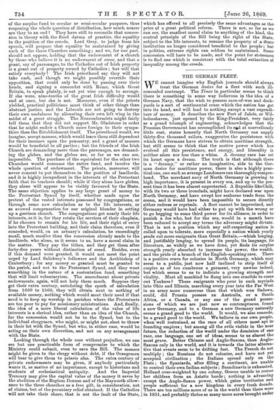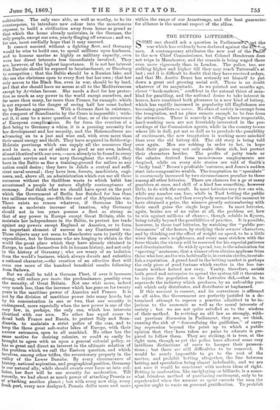THE GERMAN FLEET.
WE cannot imagine why English journals should always. treat the German desire for a fleet with such illconcealed contempt. The Times in particular seems to think there is something in some way ludicrous in the idea of a German Navy, that the wish to possess men-of-war and dockyards is a sort of sentimental craze which the nation has got into its head, and will lead to nothing except a vast expenditure of money. It describes the new Port of Jahde, or Wilhelmshaven, just opened by the King-President, very fairlyas a grand triumph of engineering, acknowledges that the Prussian Government has accomplished its end at marvellouslylittle cost, states honestly that North Germany can supply thirty-five thousand sailors, exaggerates the persistence with which the Germans have striven to obtain maritime strength, but still seems to think that the motive power which has evolved all this persistence, and energy, and liberality is neither niore nor less than a whim. A dreamy race has set its heart upon a dream. The truth is that although there is a "dreamy," or rather an imaginative, side to the German desire for maritime power, there is also a highly practical one, one such as average Londoners can thoroughly comprehend. The merchant navy of North Germany is growing tohigh importance, it is present in every sea, and up to the present time it has been almost unprotected. A Republic like Chili,. with its two or three ironclads, might have declared war upon. North Germany, and have swept her seaborne trade from theocean, and it would have been impossible to secure directly either redress or reprisals. A fleet cannot be improvised, and Germany would have had either to put up with the wrong or to go begging to some third power for its alliance, in order topunish a foe who, but for the sea, would in a month have been reduced to accept any terms the adversary might dictate. That is not a position which any self-respecting nation is called upon to tolerate, more especially a nation which yearly aends out more emigrants than Great Britain,—which longing, and justifiably longing, to spread its people, its language, its. literature, as widely as we have done, yet finds its surplusstrength yearly absorbed to increase the power, the wealth, and the pride of a branch of the English-speaking race. Thereis a positive crave for colonies in North Germany, which may seem to a public, just now half inclined to strip itself of empire as of too cumbrous a garment, very unwise indeed, but which seems to us to indicate a growing strength and vitality. Must all mankind be flung into one crucible to comeout Yankees ? These emigrants who pour in such myriads into Ohio and Illinois, marching every year into the Far West in an army more numerous than that which won Sadowa, could, did Prussia possess an Australia, or a South Africa, or a Canada, or any one of the grand possessions of which we are just now so contemptuous, found a new Germany, and to a German a new Germany naturally seems a grand good to the world. It would, we also concede,. be a grand good to the world. We believe in our own people, when well restrained, as the race of all others most apt in founding empires ; but among all the evils visible in the near future, the reduction of the world under the dominion of one race, one language, one set of ideas, seems to us almost the most grave. Better Chinese and Anglo-Saxons, than AngloSaxons only in the world, and it is towards the latter alternative that events seem to be drifting fast. The French do not multiply ; the Russians do not colonize, and have not yet accepted civilization ; the Italians spread only on the Plate ; the Spaniards, after filling a continent, are unableto control their own Indian subjects ; Scandinavia is exhausted, Holland over-weighted by one colony, Greece unable to rescue her children from an Asiatic horde ; nothing is advancing except the Anglo-Saxon power, which gains territories and people sufficient for a new kingdom in every fresh dec,ade. There are ten millions more of us in the world than there were in 1851, and probably thrice as many more acres brought under
cultiration. The only race able, as well as worthy, to be its counterpoise, to introduce new colour into the monotonous expanse, to build a civilization away from home as grand as that which the home already maintains, is the German, the only people, except our own, yearly flinging off swarms ; and we, for one, most cordially hope that it may succeed. It cannot succeed without a fighting fleet, and Germany would be wise to build one, to spend millions upon harbours, and to honour marine as highly as military capacity, even were her direct interests less immediately involved. They are, however, of the highest importance. It is not her interest that Dan tzic should be exposed to bombardment, or Hamburg to occupation ; that the Baltic should be a Russian lake, and the sea she christens open to every fleet but her own ; that her only access to the Black Sea, even in war, should be by land, and that she should have no access at all to the Mediterranean except by Arstrian favour. She needs a fleet for her protection as much as any power in the world except ourselves, and far more than many, far more than France, for example, which is not exposed to the danger of seeing half her coast locked up by Russian aggression. With a German fleet in existence, the conquest of Scandinavia by the Czars is impossible ; without it, it may be a mere question of time, or of the occurrence of European complicetions. So far from the creation of a fleet being to Germany a whim, it is a pressing necessity for her development and her security, and the Hohenzollerns are advancing on to a just and wise end, with even more than their usual energy and thrift. They have acquired in Schles wigHolstein provinces which can supply all the resources they need in men, a race of sailors as good as our own, indeed, almost identicalwith our own,—men already to be found in every merchant service and war navy throughout the world ; they have in the Baltic as fine a training-ground for sailors as any nation could desire ; they have in Jahde a central and sufficient naval arsenal ; they have iron, forests, machinists, engineers, and, above all, an administration which can use all these resources without the thriftless waste to which habit has accustomed a people by nature slightly contemptuous of economy. Just think what we should have spent on the port which the Government of Berlin has finished for less than two millions sterling, one-fifth the cost of the Abyssinian war. There exists no reason whatever, if Germans like to endure a moderate increase of taxation, why Germany should not in ten years possess a fleet as strong as that of any power in Europe except Great Britain, able to maintain her independence in the Baltic, to protect her trade against any powers except England or America, or to form an important element of success in any Continental war. Those objects may not seem to Manchester men to justify the expenditure, but to Germans who are longing to obtain in the world the great place which they have already obtained in Europe, to make themselves felt in human history, and not only in the history of Germany ; who are weary of an isolation from the world's business, which always dwarfs and enfeebles a national character,—the creation of an effective fleet will seem one more of the hundred beneficial results following from Sadowa.
But we shall be told a German Fleet, if ever it becomes strong, will reduce pro tanto the predominance, possibly even the security, of Great Britain. Not one whit more, indeed very much less, than the increase which has gone on for twenty years in the maritime power of America and France. It is not by the division of maritime power into many hands, but by its concentration in one or two, that our security is endangered, more especially when the new power is one of the very few, is, perhaps, the only one, which has interests identical with our own. No other has equal cause to dread both France and Russia, to protect Italy and Scandinavia, to maintain a strict police of the seas, and to keep the three great salt-water lakes of Europe, with their narrow entrances, open to all mankind. No other has the same motive for desiring colonies, or could so easily be brought to agree with ns upon a general colonial policy, or has so great and direct an interest in the ultimate solution of the problem which we call the Eastern question, and which involves, among other trifles, the reversionary property in the valley of the Lower Danube. By every circumstance of history, national aspiration, and geographical position, Germany IS our natural ally, while should events ever force us into collision, her fleet will be our security for moderation. Till recently, we had about as much power of attacking Prussia as of attacking another planet ; but with every new ship, every fresh port, every new dockyard, Prussia drifts more and more within the range of our Armstrongs, and the best guarantee for alliance is the mutual respect of the allies.































 Previous page
Previous page